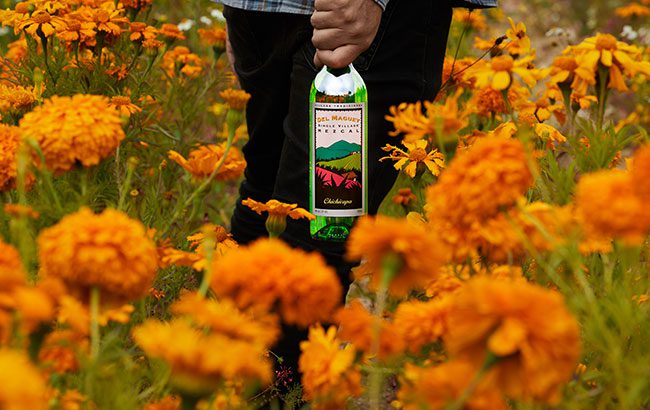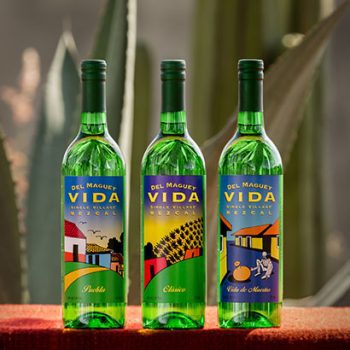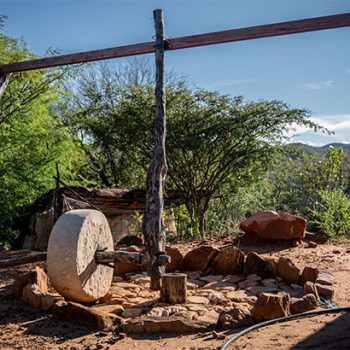The life-changing magic of mezcal
Art and alcohol often cross paths, but perhaps most authentically through the creation of mezcal – and of Del Maguey, to be specific. We reflect on 30 years of success.

Little did Ron Cooper know that a trip to Oaxaca in the 1970s would be such a fortuitous, life-changing event. That visit to Mexico would alter the trajectory of his career – and that of one of Mexico’s best-kept secrets, mezcal.
Cooper, an artist and entrepreneur, was sipping Tequila one night with two friends, when the topic turned to whether the Pan American highway really existed. Soon after, the trio packed up a VW van, loaded with surfboards, and drove south to test their theory. The drive took them through Oaxaca, where they stumbled upon a secluded weaving village – a village that decades later would go on to play a critical role in the Del Maguey story.
Through weavers in the village, artists like Cooper, he learned about the traditions of drinking mezcal. Weddings, funerals, birthdays, baptisms, each occasion would be marked with a mezcal toast. In the 1990s, mezcal’s popularity was on the rise – and Cooper felt compelled to return to Mexico to find the best mezcal to bring to the US.
“I met Ron shortly after he had discovered his incredible passion,” recalls Steve Olson, co-founder of Del Maguey mezcal. “Ron would go to villages and just ask, ‘where’s the best mezcal?’ I tasted his stuff as an agave guy and a spirits expert, and I said, ‘dude, what you have here is magic’.”
In 1995, Del Maguey mezcal was officially born as a brand – and this year marks the brand’s 30th anniversary.
“There are really only a few [mezcal] brands, and none of them have been as successful as Del Maguey, that can claim to have been existing for 30 years,” says Michael Merolli, CEO of House of Tequila, the agave spirits arm of Pernod Ricard, and majority stakeholder of Del Maguey since 2017. “We are proud to celebrate this.”

Approved by bartenders
Part of the secret to the brand’s success, believes Merolli, is Del Maguey’s rapport with bartenders. “This is the way, usually, you build a category like mezcal,” he explains, “which is not an easy one. This is a big focus for us in the US because it’s already a developed category for the trade. Outside of the US, it’s mainly an on-trade SKU. That’s why we are celebrating 30 years; we have huge credentials among the bartender community, and we are leveraging it to make sure that they are the first ambassadors of mezcal and Del Maguey through cocktails.”
A key component to Del Maguey’s popularity is the brand’s strong availability, note both Olson and Merolli. Del Maguey’s Vida Collection comprises three expressions that showcase subtle flavour differences distilled from Espadín agave. In 2023, Del Maguey Vida Puebla became the third member of the Vida Collection.
Designed specifically to be a more approachable mezcal, the agave is roasted underground and naturally fermented, undergoing a double distillation in copper stills, before being bottled at 40% ABV. It is described as rich, yet mellow, with notes of roasted agave, white peach, candied pine, and a ‘gentle citrus lift’ – arguably a more relatable profile than the smokier, at times funkier flavours mezcal is known for. The price is equally attractive at RRP US$37.99 per 750ml bottle.
“The way it has been built in terms of liquid is that it’s really smooth and really easy for people to like it,” adds Merolli.

Respecting the tradition of mezcal production that had been handed down from generation to generation has always been of utmost importance to Del Maguey. While there are rules and regulations governing what constitutes mezcal, each palenque (mezcal distillery) has its own traditions that can drastically change the end product. “That was the whole concept behind Del Maguey Single Village Mezcal, to show people how these artists, these mezcal makers, made all the difference in the world,” notes Olsen.
Del Maguey showcases the breadth of flavour potential in mezcal and the diversity of Oaxaca’s villages through its Village Tradiciones Collection, which includes Del Maguey Chichicapa. Then there is the Village Varietales Collection, with variants including Del Maguey Mezcal Tobalá and Del Maguey Wild Tepextate Mezcal. Each bottle represents a unique agave species, designed for mezcal collectors seeking new experiences and a journey of discovery, one that reflects the journey the founders of Del Maguey have also taken.
Along the way, Olson, Merolli and all involved in the brand’s making have ensured the sense of artistry, respect for tradition and the people who make mezcal have not been forgotten. In fact, quite the contrary.
Putting producers first
Since the beginning, Del Maguey has been committed to contributing to the social and economic developments of the Zapotec and Mixtec communities that have made the brand’s success possible, through construction, healthcare, education, and fair wages.
As the brand steps into its next 30 years, its practice of taking a philanthropic approach to work and business will remain a focal part of the brand’s purpose. That will include continued support for initiatives such as the Reforestation Program, which plants trees in communities where the brand works, the Digital Library Program, which provides computers and USB drives for education, and Growers First, an advocate for health care for farmers in remote areas of the world, including Oaxaca.
It is an undeniably exciting time for the Del Maguey brand – and for the wider mezcal category, as awareness and interest in the agave spirits continues to soar.
“The growing cultural influence in Mexico has been very powerful for people to enter the Tequila and mezcal categories,” Merolli says. “You have to be introduced to the world of mezcal – it’s not an easy one. But once you enter, you discover how it is so deep. There is so much to learn and understand. Myself, I’m still learning and understanding. Mezcal is like the single malt of agave, with all different styles, tastes, and processes. For me, it is as rich as a single malt.”
To many, 30 years will sound like a long time. But in many ways, it feels as though Del Maguey is only getting started. “The one thing I’m most excited about,” notes Olson as he reflects on the next phase for Del Maguey, “is that we are handing this off in really good shape to people that I believe and hope will be able to continue carrying the torch of sustainability, of working with the families, and of supporting the villages.”
Related news
Pernod completes Del Maguey acquisition
